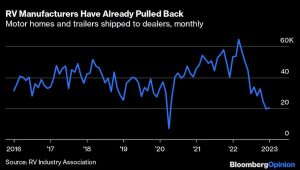Is an RV Downturn the Same Recession Signal as Before?
 EDITOR’S NOTE: The following analysis is by Justin Fox of Bloomberg, which was published by The Washington Post.
EDITOR’S NOTE: The following analysis is by Justin Fox of Bloomberg, which was published by The Washington Post.
When the US recreational vehicle industry has slumped in the past, it has often been a sign that a recession is on its way. RVs are discretionary purchases, often paid for with borrowed money, so they can signal a softening of consumer demand before it shows up in other spending categories.
Right now, times are tough in the RV business. The biggest manufacturer, Thor Industries of Elkhart, Indiana, announced this week that its net sales for the quarter ended Jan. 31 were down 39% from the same period a year earlier. Earnings per share were down 90%, and the company downgraded the outlook for the rest of its fiscal year. Late last month, the RV Industry Association reported that manufacturers’ shipments to dealers were down 61.8% in January compared with those in the month a year earlier.
But is that a sign that a recession is coming, or just that Americans have enough motor homes and trailers for now? After a buying boom that began in mid-2020 as RVs offered a unique means of escape from Covid-19 risks and restrictions, and continued through mid-2022, something probably had to give.
Even now, sales aren’t terrible — as of January, seasonally adjusted real RV spending as estimated by the US Bureau of Economic Analysis appeared to be back to its pre-2019 trend. But the downward adjustment from a sales boom like the one of the past couple of years can still be wrenching.
RV manufacturers did see the declines coming and began to cut back sharply on shipments to dealers in the middle of last year.

They also began to cut back on employment around then, at least according to the proxy measure of manufacturing jobs in the Elkhart-Goshen metropolitan area (Thor is far from the only RV maker there), although through November the cuts hadn’t been especially deep.
One interesting thing about the accompanying chart is it shows a pretty significant retrenchment starting in 2018. It was that, along with a visit to the RV/MH Hall of Fame in Elkhart (highly recommended), that got me interested in the industry’s role as economic bellwether. And yes, the RV downturn in 2018 and 2019 was followed by yet another recession. But it was a short deep one caused by a pandemic, not a standard cyclical downturn.
Now the Federal Reserve is trying to slow the economy to tame inflation, a more traditional path to recession. But in the aftermath of unprecedented pandemic shutdowns, unprecedented government aid and unprecedented changes in spending patterns, the economy is proving especially hard to read using conventional metrics. The RV slowdown could be the signal that cuts through all the noise. Or it could just be more noise.
Source: https://rvbusiness.com/is-an-rv-downturn-the-same-recession-signal-as-before-2/






